Superior artists are not only extraordinarily gifted in their specific area of interest, they are also extremely skilled in the art of teasing. Björk is one of those artists capable of generating interest far beyond normally tolerated levels with each and every one of her feats. News and speculations have been circulating about Björk’s Biophilia for months. Rumors initially stated that Biophilia was a sound installation, then that it was a documentary, then some kind of interactive album. The suspicion Biophilia was all these things together dawned on the media. After the shows at Manchester International Festival last month and with the recent release of her iPad/iPhone app, we are finally given the opportunity to enter the world of Björk’s latest experiment, something that encompasses music, visual art, philosophy, poetry and science. Expectations are definitely exceeded.
Biophilia is an ambitious project, not because of its musical value alone or because the concept behind might appear so intricate; it is neither ambitious simply for the impressive technological efforts and research that led to its actualization. What makes Biophilia such a momentous specimen — and so hard to define — is the fact it is much more than what we are commonly used to expect from even the most accomplished artists.
Given the fact Biophilia’s shows at Harpa are sold out and I couldn’t secure a ticket — boo… — and that I have been a moderate but loyal Björk follower for quite some time, the least I could do was getting the iPad app on the day its release and try it right away.
Biophilia’s project went through a significant evolution in the course of the years, shifting from the form of more traditional art/sound installation to a 3D movie, until technology finally managed to catch up with Björk’s ideas. Biophilia is complex and protean: in its most tangible manifestation, it is conceived as a universal application, designed to work both on the iPhone and on the iPad — and iPod Touch, too. Opening the app for the first time, I didn’t know exactly what to expect. Surely enough, the description of “interactive album” some media attached to it is quite misleading.
An introduction narrated by David Attenborough provides the general guidelines to Biophilia’s project: as a whole, Biophilia, the “love for Nature in all her manifestations”, wants to offer an exploration of universe and its principles, demonstrating how sameness embraces everything, from natural phenomena to man-made creations. As “much of Nature is hidden from us”, we can use technology to reveal what Nature conceals, in the same way as with music we reveal our hidden emotions to others.
Cosmogony is the mother app, the genetrix from whom every other instance descends. It features the song bearing the same name with lyrics and animation, an in-depth analysis of its contents and its score. As they say, all mothers are priceless, thus Cosmogony comes for free in the App Store. Biophilia’s app is visualized as an astronomical system waiting to be filled. The main screen contains several slots, each bearing a title corresponding to an expansion/song. Among them, only two are lighted with a glowing white; the others, of a darker color, are yet to be released:
- Cosmogony
- Thunderbolt
- Sacrifice
- Virus
- Mutual Core
- Hollow
- Moon
- Solstice
- Dark Matter
- Crystalline
A song that became the world we know.
Cosmogony is the foundation and the means which can be employed to understand the whole. Likening different creationist myths, Cosmogony doesn’t really endorse a theory or belief over another. It rather attests a profound sense of wonder at the beauty of the universe, which resounds in the slow pace and solemnity of brass in the song. Ever since human started asking himself questions, the origin of the universe and how reality came into existence have been enigmas essential to his being. With religion, philosophy, art and science, man tried to unveil the heart of the very essence of creation. Cosmogonies followed one another through history, each of them presenting a unique and equally valuable approach to understanding “all there is”.
Apart from Cosmogony, for the present moment, only Crystalline is available in Biophilia’s app (through in-app purchase at $1.99/€1.59). Crystalline comes with an introductory note, a puzzle game, and of course, the song, which includes, like for Cosmogony, animation, lyrics and score. Unfortunately, I couldn’t access neither score sections: the app crashed on me every time I tried opening them on the iPad.
Listen how they grow.
Crystalline explores one of the many implications of Biophilia’s central theme: how natural and human are in deep connection. The persistent hammering of the gameleste, embodied by the image of the crystals, evokes a sense of claustrophobic tension, which constantly builds up, until it encounters moments of temporary release. The dualism restraint/freedom, rigidity/openness runs through the whole song, both in the lyrics and in the music.
You will forgive the nerd in me if I affirm that the way Crystalline’s puzzle game works is, at its core, somewhat similar to Katamari (I’m pretty sure it cannot be a coincidence, even under a purely conceptual point of view): by tilting the device, instead of using a controller, the user lets a crystal grow while acquiring new elements, in a maze-like track of tunnels. By collecting crystals in given sequences, new tunnels are unlocked one by one, each corresponding to modules of Crystalline’s song. Playing the game is unusually rewarding and it works as a sort of meditation device. After a few rounds of crystal collecting through the game track and its minimal shapes, lines and a colors, the brain adjusts to the music proceeding in loops and to the visuals. For a more immersive experience, headphones are needed.
In Crystalline, Björk plays with the fundamental notions of songwriting, giving the users tools to examine and upset the conventional verse-chorus-verse structure, by rearranging individual song components in new orders. Like a natural system, a song is a complex entity, in which every separate part has a well defined role: natural (crystals, in this case) and human creation (music) are ruled by the same laws, which can be fully understood thanks to technology.
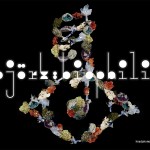
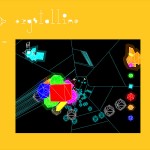
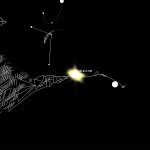
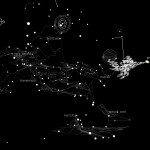
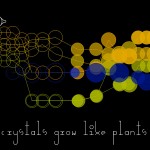
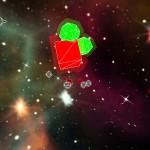
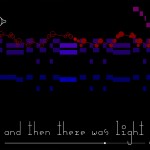
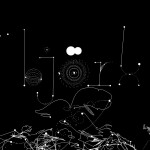

I hope the crashes eventually get sorted out. I’d love to see the score section.
Yes, hopefully they will fix this issue with the next updates.
Hoorah! The ipad just needed to be rebooted.
I kinda suspect they tested this on iPad 2, mostly 😛